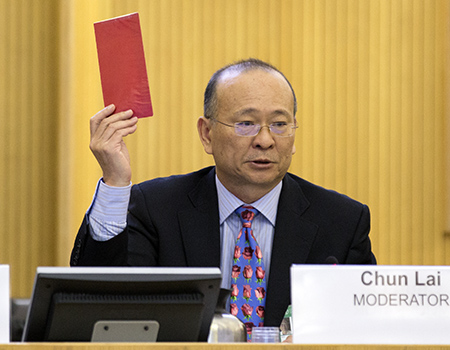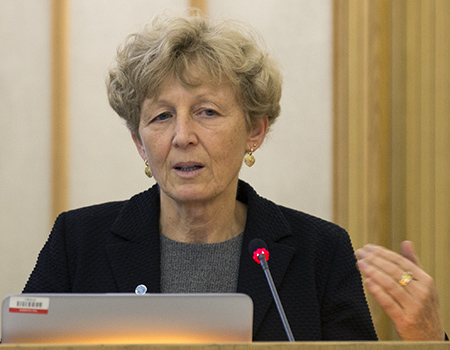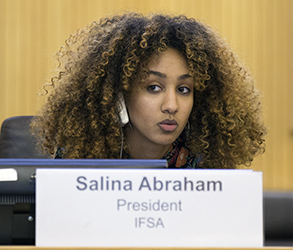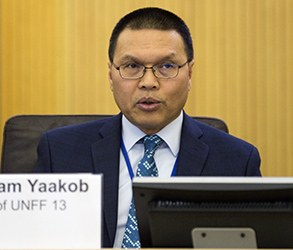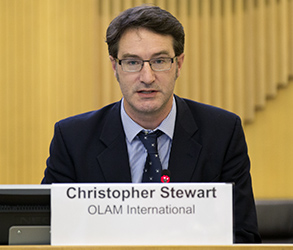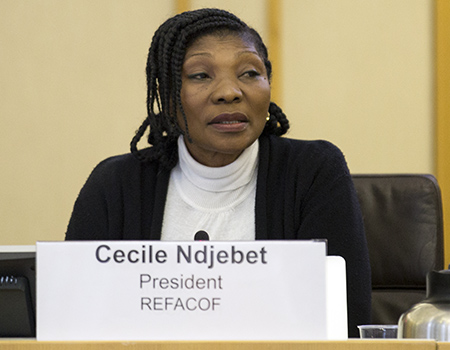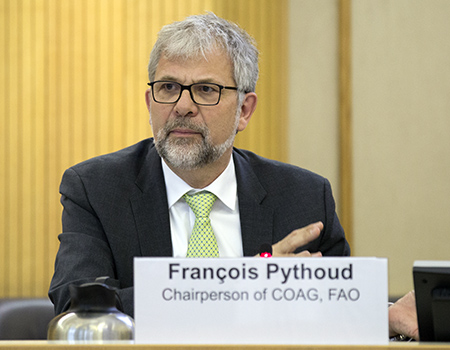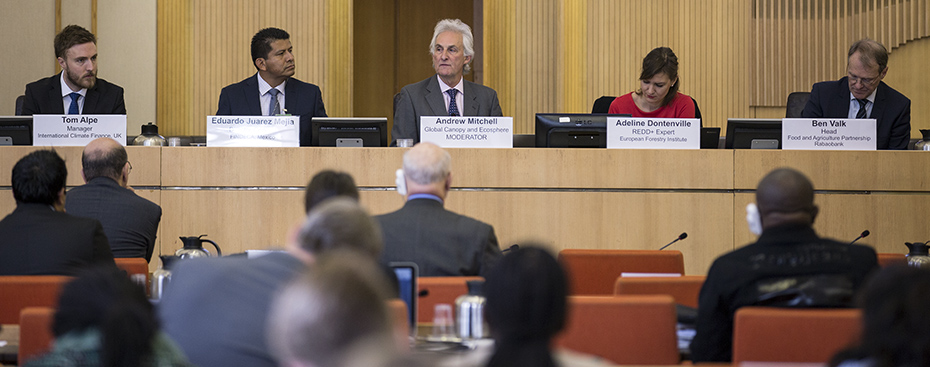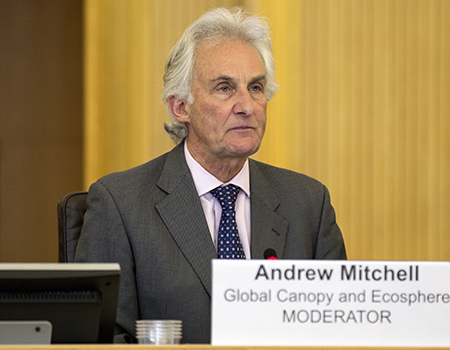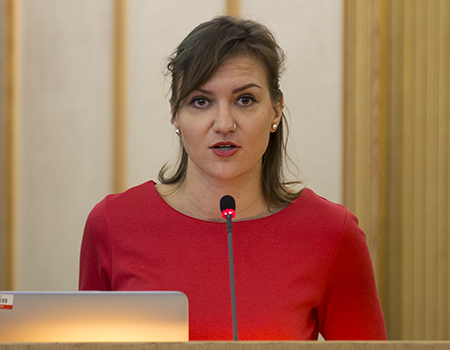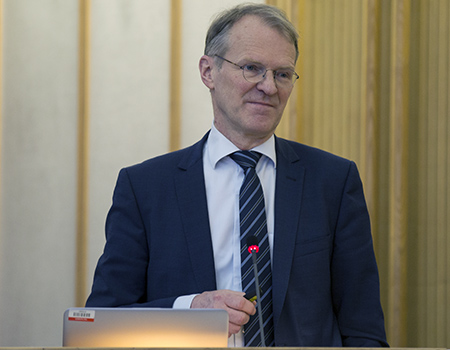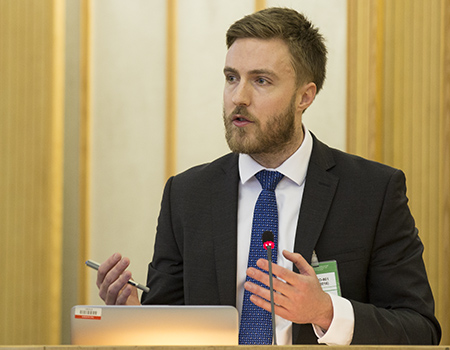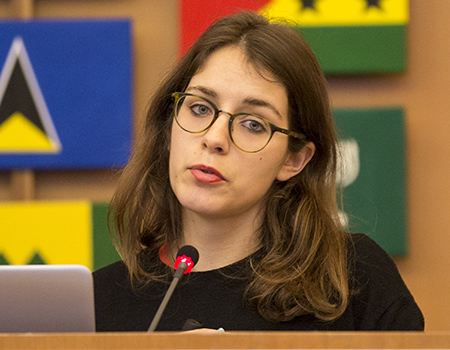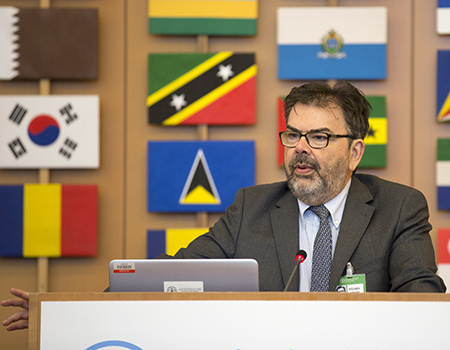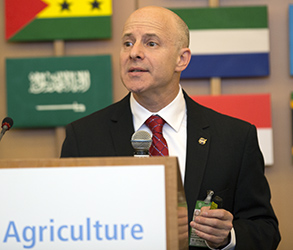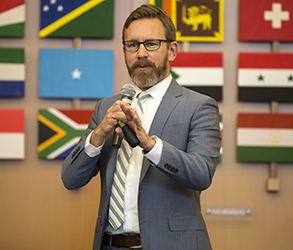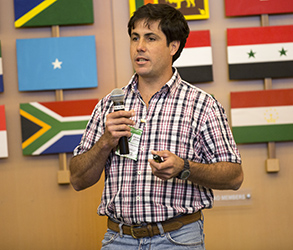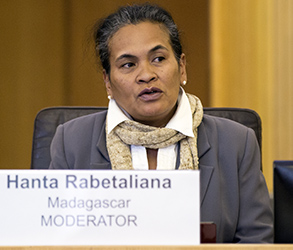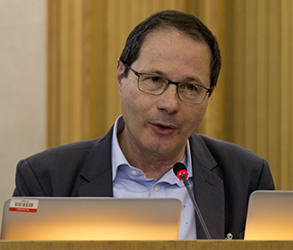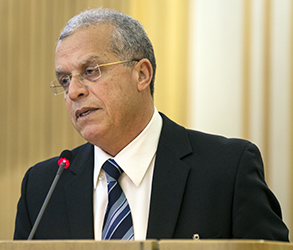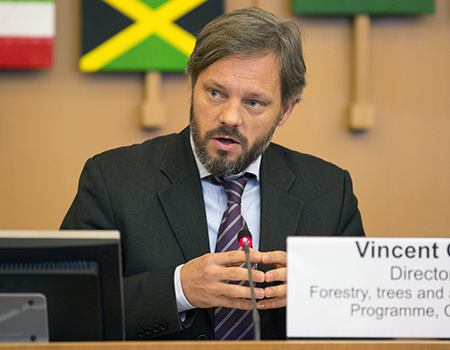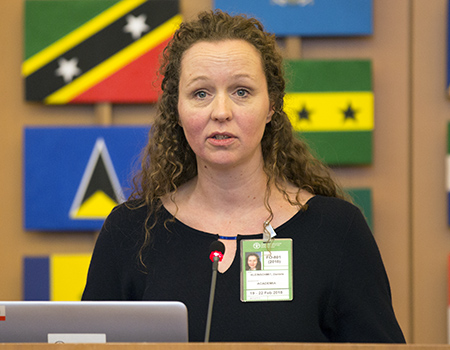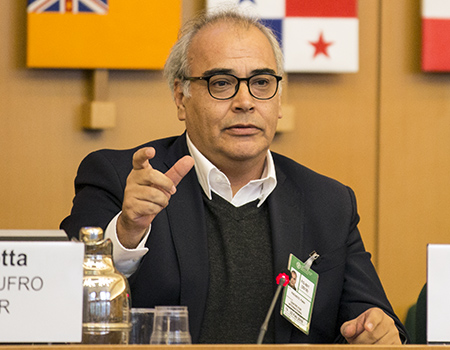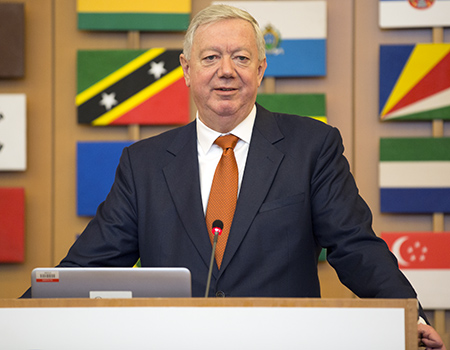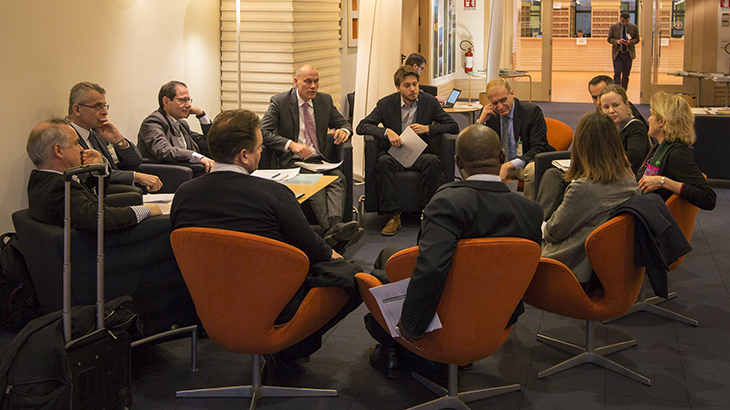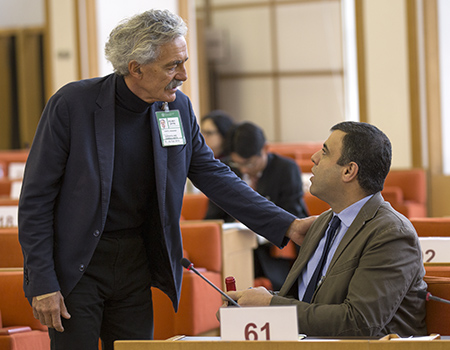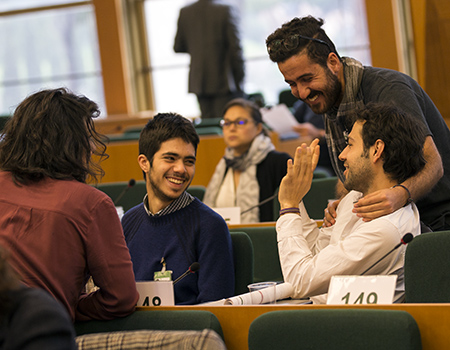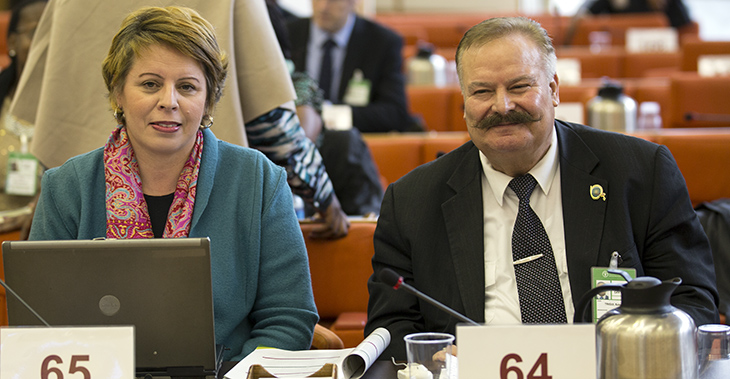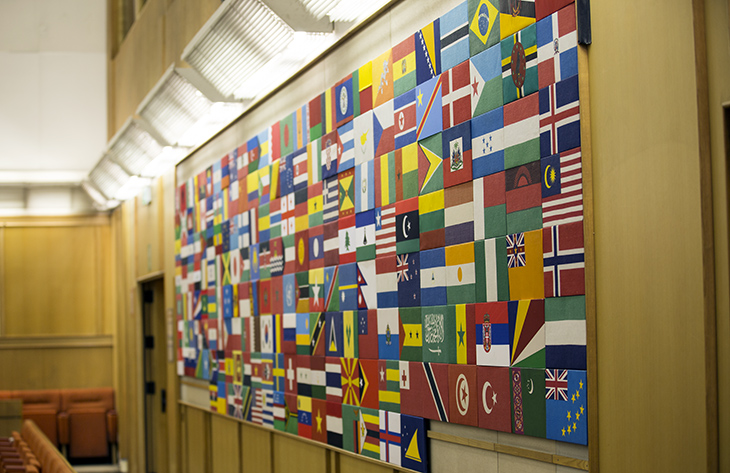Summary
On Thursday morning, participants met to discuss innovative instruments to upscale progress: financing, technologies and research. Parallel sessions addressed: public and private international finance; innovative technologies for land-use monitoring; financial instruments to mobilize domestic funding; and the role of science and research.
In the afternoon, plenary discussed a series of key messages, including:
- maintaining sufficient productive, diverse and healthy forests is crucial for achieving the SDGs, and climate and biodiversity targets;
- achieving SDG 15.2 on halting deforestation by 2020 and Target 1.1 of the UN Strategic Plan for Forests on reversing the loss of forest cover and increasing forest areas by 3% worldwide by 2030 can only be achieved through political will, individual motivation and concerted collective action, adequate governance frameworks and involvement of multiple actors;
- halting deforestation requires corporate responsibility of agribusiness, supported by international trade instruments and consumer education;
- scaling up finance and investment requires positive incentives, improved legality, public-private partnerships, innovative instruments and de-risking private sector investment;
- land-use competition between forests and agriculture can be solved by a landscape approach to increase resilience; and
- expanded research is required to provide practical pathways that support the development of evidence-based policies.
Some participants urged limiting the number of key messages to four, while others made suggestions for additions and revisions, including on: the urgency of addressing deforestation; focus on restoration; the contribution of indigenous and tribal peoples; triggers of transformational change; involvement of smallholders; and focus on actionable recommendations to target groups such as governments, the private sector, civil society, and the research community.
Plenary then addressed the Co-Chairs’ summary of the parallel thematic sessions. Participants suggested additions, including on: certification; action by governments to regulate agribusiness; the need for tenure reform; review of agricultural subsidies; forest-related education, vocational training and extension; and results-based payments for REDD+ for financing sustainable landscape management.
Co-Chairs Hiroto Mitsugi and Ikram Yaakob noted that the key messages and the Co-Chairs’ summary will be revised and posted on the meeting website, before transmission to the 13th session of the UN Forum on Forests (UNFF 13) and to the 2018 session of the High-level Political Forum (HLPF). The meeting closed at 17:18 pm.
IISD Reporting Services, through its ENB+ Meeting Coverage, has provided daily web coverage and a summary report from the International Conference on “Working Across Sectors to Halt Deforestation and Increase Forest Area - From Aspiration to Action.” The summary report is now available in HTML and PDF.
Photos by IISD/ENB
For photo reprint permissions, please follow instructions at our Attribution Regulations for Meeting Photo Usage Page
Plenary Session
Chun Lai, Moderator, Independent Environmental Services Professional
Eva Müller, Director, Forestry Department, FAO
Salina Abraham, Youth Coordinator, Global Landscapes Forum - President, International Forestry Students' Association (IFSA)
Co-Chair Ikram Yaakob, Chair of UNFF 13
Christopher Stewart, Head of Corporate Social Responsibility, OLAM
Cécile Ndjebet, President, African Women's Network for Community Management of Forests (REFACOF)
François Pythoud, Chair, FAO Committee on Agriculture, and Permanent Representative of Switzerland to FAO
Public and private international finance
From L-R: Tom Alpe, International Climate Finance Manager, Forests and Land Use, Department for Business, Energy and Industrial Strategy (BEIS), UK; Eduardo Juarez Mejia, Director-General, FINDECA, Small and Medium Enterprises, Mexico; Andrew Mitchell, Founder and Director, Global Canopy Program and Ecosphere+; Adeline Dontenville, REDD+ Expert, EU REDD Facility, European Forestry Institute; and Ben Valk, Head, Food and Agriculture Partnerships, Rabobank
Andrew Mitchell, Founder and Director, Global Canopy Program and Ecosphere+
Adeline Dontenville, REDD+ Expert, EU REDD Facility, European Forestry Institute
Ben Valk, Head, Food and Agriculture Partnerships, Rabobank
Tom Alpe, International Climate Finance Manager, Forests and Land Use, BEIS, UK
Innovative technologies for land-use monitoring
Sara Aparicio, Young Graduate Trainee, European Space Agency (ESA)
Gilberto Câmara, Researcher, National Institute for Space Research (INPE), Brazil
Daniel Irwin, Research Scientist, National Aeronautics and Space Administration (NASA) Marshall Space Flight Center
Erik Lindquist, Forestry Officer, FAO
Diego Mohr Bell, Geomatic Coordinator, Conocimiento e Innovación en Bosques Patagónicos (CIEFAP), Argentina
Financial instruments to mobilize domestic funding
From L-R: Ulrich Apel, Senior Environmental Specialist, Global Environment Facility (GEF); Pascal Martinez, Climate Change Specialist, GEF; Alain Karsenty, Senior Researcher, Centre for Agricultural Research, Cooperation and Development (CIRAD), Department of Environment, France; Hanta Rabetaliana, Former General Secretary, Ministry of Environment and Forests, Madagascar; and Youssef Saadani, Former Director, General Directorate of Forestry, Tunisia
Hanta Rabetaliana, Former General Secretary, Ministry of Environment and Forests, Madagascar
Alain Karsenty, Senior Researcher, CIRAD
Youssef Saadani, Former Director, General Directorate of Forestry, Tunisia
The role of science and research
Vincent Gitz, Director, Program on Forests, CGIAR
Daniela Kleinschmit, Professor of Forest and Environmental Policy, University of Freiburg, Germany
Pablo Pacheco, Principal Scientist, Center for International Forestry Research (CIFOR)
Hans Hoogeveen, Ambassador/ Permanent Representative of the Netherlands to the FAO
Between Sessions
Attia Rafla, and Salem Trigui, Tunisia
